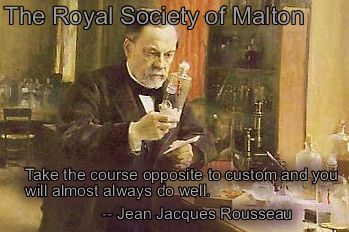Royal Society of Malton: Difference between revisions
No edit summary |
Vanitas Mori (talk | contribs) mNo edit summary |
||
| (3 intermediate revisions by 3 users not shown) | |||
| Line 1: | Line 1: | ||
{| style=" | {| style="width:850px; font-family: verdana; font-size:90%" align=center CELLPADDING=0 CELLSPACING=0 | ||
|- | |- | ||
| | | style="width:700px; padding:10px; background-color: #3B5323; border-left:solid 2px #003300; border-right: solid 2px #003300; border-top:solid 2px #003300; border-bottom:solid 2px #003300"| | ||
{{RSoMBox}} | |||
{| style="padding: 10px; vertical-align:top; background-color:#567E3A; border:solid 1px #003300; height: 374px; width: 445px" | |||
| | |||
<div align=center> | |||
|style="padding | <big><b>What is the Royal Society?</b></big></div align> | ||
---- | |||
The Royal Society of Malton is an organization consisting of both groups and individuals that wish to follow an intellectual pursuit in addition to their various daily activities. Though the [[Philosophe Knights|{{C|BLACK|Philosophe Knights}}]] began and run the Royal Society, the organization is not affiliated to any other cause than that of education. | |||
<br> | |||
<br> | |||
<div align=center> | |||
<big><b>Joining the Royal Society</b></big></div align> | |||
| | ---- | ||
| | Becoming a member of the Royal Society is a rather straightforward process, simply add either of the following templates to your page (click on the letters between the brackets to see the template): | ||
<div align=center> | |||
{{[[Template:RSoM|{{C|BLACK|RSoM}}]]}} | |||
<br> | |||
{{[[Template:SmallRSoM|{{C|BLACK|SmallRSoM}}]]}} | |||
</div align> | |||
| | |||
|} | |} | ||
<br> | |||
<br> | |||
<big><b>Philosophy</b></big> | |||
---- | |||
<br> | |||
<br> | |||
<br | <div align=center> | ||
< | |||
< | |||
= | |||
{{Centers of Learning Policy}} | {{Centers of Learning Policy}} | ||
{{Artifact Protection Policy}} | {{Artifact Protection Policy}} | ||
{{Fine Art of Malton}} | {{Fine Art of Malton}} | ||
</div align> | |||
<br> | |||
<br> | |||
<big><b>Suggested Reading</b></big> | |||
---- | |||
<br> | |||
"Zombies" | "Zombies" | ||
First published Mon Sep 8, 2003; substantive revision Mon Oct 9, 2006 [http://plato.stanford.edu/entries/zombies/ Entire Article] | First published Mon Sep 8, 2003; substantive revision Mon Oct 9, 2006 [http://plato.stanford.edu/entries/zombies/ {{C|BLACK|Entire Article}}] | ||
The following is an excerpt from the aforementioned article. | The following is an excerpt from the aforementioned article. | ||
{| style="padding:10px; vertical-align:top; background-color:# | {| style="padding:10px; vertical-align:top; background-color:#567E3A; border:solid 1px #003300" | ||
| <center>Zombies are exactly like us in all physical respects but have no conscious experiences: by definition there is ‘nothing it is like’ to be a zombie. Yet zombies behave like us, and some even spend a lot of time discussing consciousness. This disconcerting fantasy helps to make the problem of phenomenal consciousness vivid, especially as a problem for physicalism. | | <center>Zombies are exactly like us in all physical respects but have no conscious experiences: by definition there is ‘nothing it is like’ to be a zombie. Yet zombies behave like us, and some even spend a lot of time discussing consciousness. This disconcerting fantasy helps to make the problem of phenomenal consciousness vivid, especially as a problem for physicalism. | ||
Few people think zombies actually exist. But many hold they are at least conceivable, and some that they are ‘logically’ or ‘metaphysically’ possible. It is argued that if zombies are so much as a bare possibility, then physicalism is false and some kind of dualism must be accepted. For many philosophers that is the chief importance of the zombie idea. But the idea is also of interest for its presuppositions about the nature of consciousness and how the physical and the phenomenal are related. Use of the zombie idea against physicalism also raises more general questions about relations between imaginability, conceivability, and possibility. Finally, zombies raise epistemological difficulties: they reinstate the ‘other minds’ problem. | Few people think zombies actually exist. But many hold they are at least conceivable, and some that they are ‘logically’ or ‘metaphysically’ possible. It is argued that if zombies are so much as a bare possibility, then physicalism is false and some kind of dualism must be accepted. For many philosophers that is the chief importance of the zombie idea. But the idea is also of interest for its presuppositions about the nature of consciousness and how the physical and the phenomenal are related. Use of the zombie idea against physicalism also raises more general questions about relations between imaginability, conceivability, and possibility. Finally, zombies raise epistemological difficulties: they reinstate the ‘other minds’ problem. | ||
|} | |||
|} | |} | ||
Latest revision as of 16:55, 27 January 2010
The following is an excerpt from the aforementioned article.
| |||||||||||||||||||||||||||



